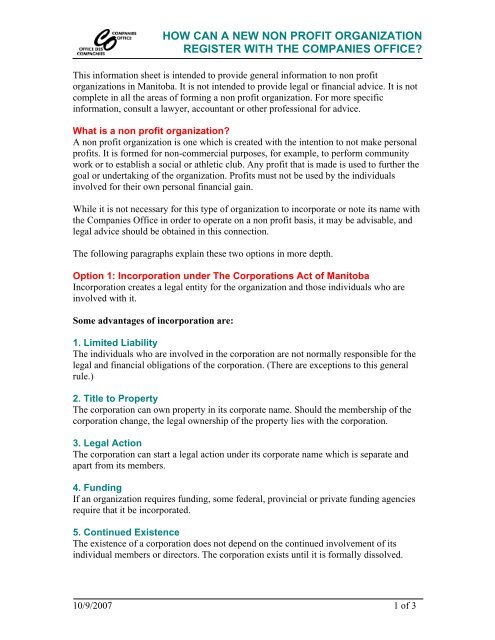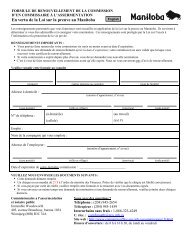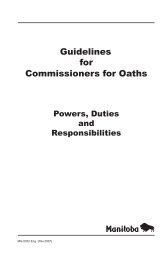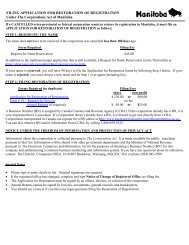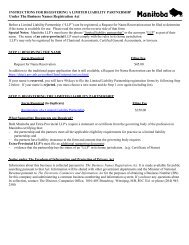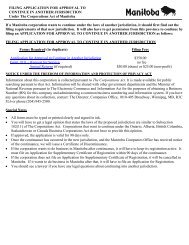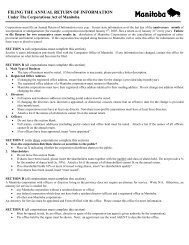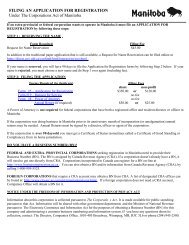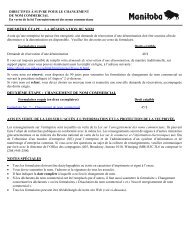How Can a New Non-Profit Organization ... - Companies Office
How Can a New Non-Profit Organization ... - Companies Office
How Can a New Non-Profit Organization ... - Companies Office
You also want an ePaper? Increase the reach of your titles
YUMPU automatically turns print PDFs into web optimized ePapers that Google loves.
HOW CAN A NEW NON PROFIT ORGANIZATION<br />
REGISTER WITH THE COMPANIES OFFICE?<br />
This information sheet is intended to provide general information to non profit<br />
organizations in Manitoba. It is not intended to provide legal or financial advice. It is not<br />
complete in all the areas of forming a non profit organization. For more specific<br />
information, consult a lawyer, accountant or other professional for advice.<br />
What is a non profit organization?<br />
A non profit organization is one which is created with the intention to not make personal<br />
profits. It is formed for non-commercial purposes, for example, to perform community<br />
work or to establish a social or athletic club. Any profit that is made is used to further the<br />
goal or undertaking of the organization. <strong>Profit</strong>s must not be used by the individuals<br />
involved for their own personal financial gain.<br />
While it is not necessary for this type of organization to incorporate or note its name with<br />
the <strong>Companies</strong> <strong>Office</strong> in order to operate on a non profit basis, it may be advisable, and<br />
legal advice should be obtained in this connection.<br />
The following paragraphs explain these two options in more depth.<br />
Option 1: Incorporation under The Corporations Act of Manitoba<br />
Incorporation creates a legal entity for the organization and those individuals who are<br />
involved with it.<br />
Some advantages of incorporation are:<br />
1. Limited Liability<br />
The individuals who are involved in the corporation are not normally responsible for the<br />
legal and financial obligations of the corporation. (There are exceptions to this general<br />
rule.)<br />
2. Title to Property<br />
The corporation can own property in its corporate name. Should the membership of the<br />
corporation change, the legal ownership of the property lies with the corporation.<br />
3. Legal Action<br />
The corporation can start a legal action under its corporate name which is separate and<br />
apart from its members.<br />
4. Funding<br />
If an organization requires funding, some federal, provincial or private funding agencies<br />
require that it be incorporated.<br />
5. Continued Existence<br />
The existence of a corporation does not depend on the continued involvement of its<br />
individual members or directors. The corporation exists until it is formally dissolved.<br />
10/9/2007 1 of 3
HOW CAN A NEW NON PROFIT ORGANIZATION<br />
REGISTER WITH THE COMPANIES OFFICE?<br />
Some disadvantages of incorporation are:<br />
1. It is more expensive to incorporate.<br />
2. It is more complex to operate. There is more of an administrative burden in that,<br />
for example, an auditor may have to be appointed, and annual return filings are<br />
required by the <strong>Companies</strong> <strong>Office</strong>.<br />
3. It is more expensive to operate.<br />
General Information About Incorporation<br />
• A director of a corporation:<br />
o must be 18 years of age or older<br />
o must be an individual<br />
o cannot be bankrupt<br />
• There is a minimum of three directors required.<br />
• The undertaking of the corporation must be either patriotic, religious,<br />
philanthropic, charitable, educational, agricultural, scientific, literary, historical,<br />
artistic, social, professional, fraternal, sporting or athletic in nature.<br />
• The name of the corporation must end with a legal element, i.e. either the word,<br />
"Incorporated", "Incorporee", "Inc.", "Corporation", or "Corp.". The words,<br />
"Limited", "Limitee", "Ltd.", or "Ltee" are prohibited.<br />
• The corporation must have its registered office in Manitoba. This address is where<br />
the corporate records are kept (e.g. minute book), and where the corporation may<br />
be contacted. The registered office must be a physical address.<br />
• A corporate seal is not required under The Corporations Act. <strong>How</strong>ever, if desired,<br />
the organization can buy a seal from one of the companies listed in the Yellow<br />
Pages under "Seals-Notary and Corporation".<br />
• By-laws are the rules which govern the internal affairs of the corporation. Bylaws<br />
are not filed with the <strong>Companies</strong> <strong>Office</strong>. The following are matters that may<br />
be dealt with in a company’s by-laws: membership, directors, fiscal year,<br />
meetings, voting, amendments, and record keeping.<br />
• The by-laws and certain financial records of the corporation should be available<br />
for inspection by its members.<br />
• If a corporation desires to be exempt from paying taxes and be able to give tax<br />
deductible receipts for donations, it must apply for charitable status. The toll free<br />
Federal Charities No. is 1-800-267-2384.<br />
Option 2: Filing a Name Notation under The Corporations Act of Manitoba<br />
Any person, partnership, or association may make a notation of a name under which an<br />
undertaking is carried on. A name notation is typically used by non profit groups which<br />
are not incorporated. It is not mandatory and just notes the name of the organization on<br />
the records of the <strong>Companies</strong> <strong>Office</strong> for a period of three years.<br />
General Information<br />
• A name notation does not have the advantages of incorporation as shown above.<br />
10/9/2007 2 of 3
HOW CAN A NEW NON PROFIT ORGANIZATION<br />
REGISTER WITH THE COMPANIES OFFICE?<br />
• If the organization requires funding, it may not be recognized<br />
by federal, provincial, or private funding sources as it is not incorporated.<br />
• It may not be able to set up a bank account under the name notation as it is not an<br />
incorporated entity.<br />
• The name is noted for three years. If the group remains in existence after three<br />
years, it can be renewed for a further three year period.<br />
• A name notation cannot have the following words as part of its name:<br />
Incorporated, Limited, Corporation, or the abbreviation or French equivalent.<br />
Applying for Authorization to Engage in Fundraising Activity Within<br />
Manitoba<br />
A non profit organization is required to obtain authorization to engage in fundraising<br />
activities within the Province of Manitoba.<br />
• For information about authorization to engage in fundraising activity within the<br />
Province, call the Consumers' Bureau at 204-945-3800 or 1-800-782-0067 (toll<br />
free within Manitoba).<br />
• For information about authorization to engage in fundraising activity within the<br />
City of Winnipeg, call the City of Winnipeg, Licensing at 204-986-6422.<br />
• For information about additional requirements for fundraising activity within<br />
other Manitoba towns, cities or municipalities, contact the local jurisdiction.<br />
Forms and instructions are available for incorporation or name notation in person, by<br />
mail, and are also available on our Website.<br />
10/9/2007 3 of 3


